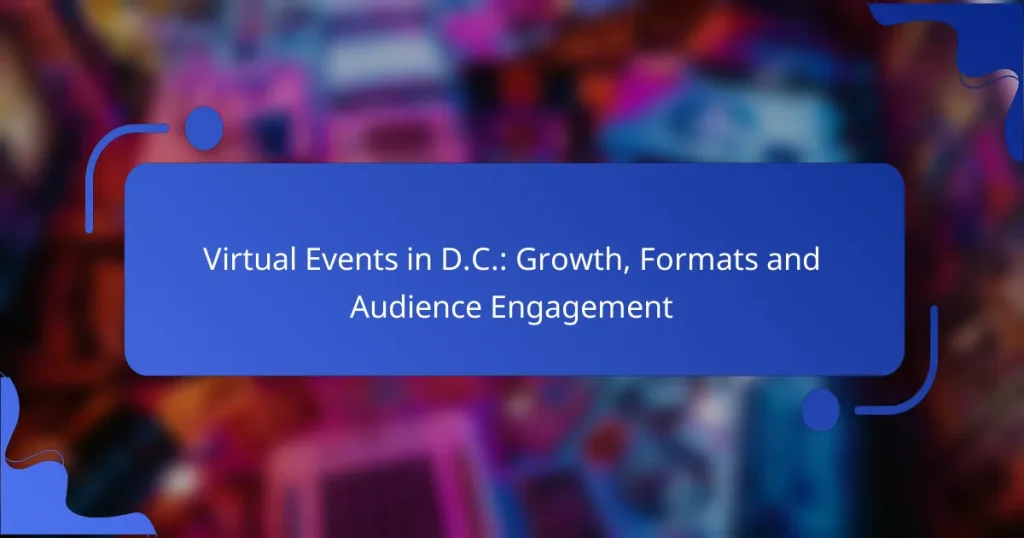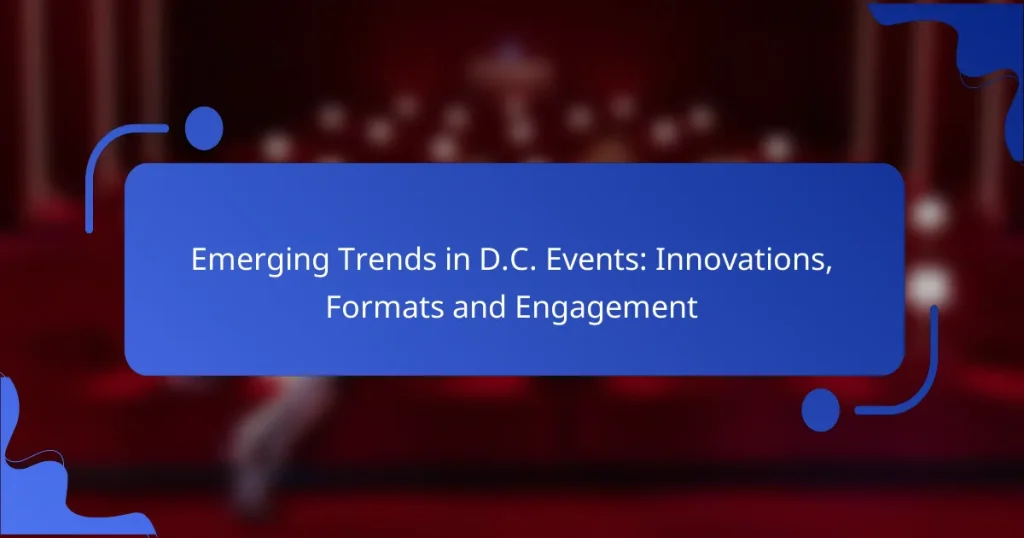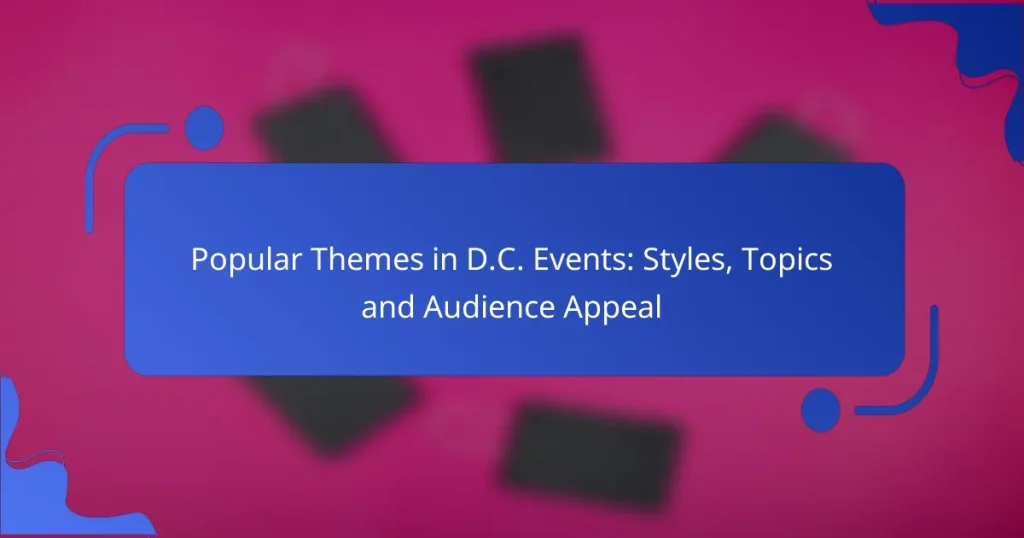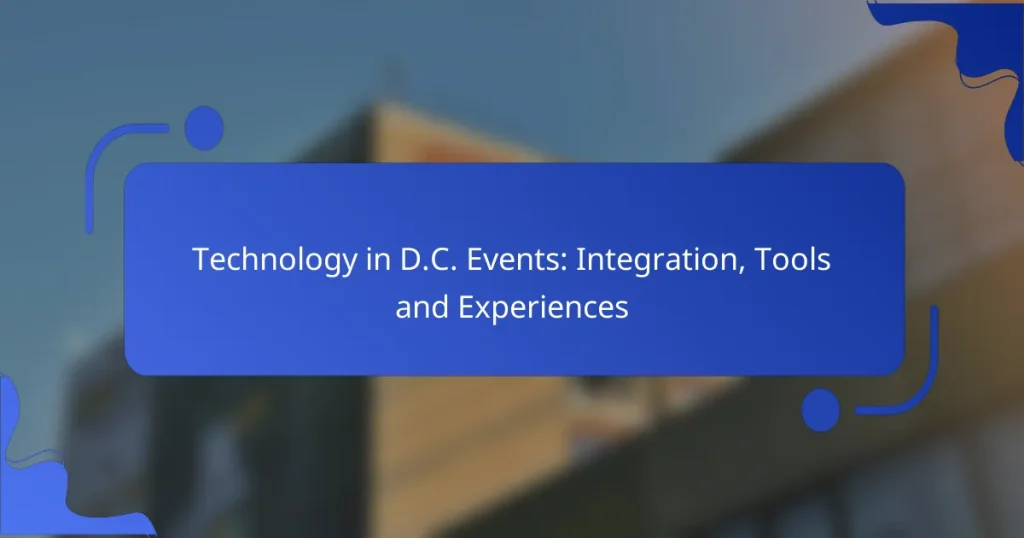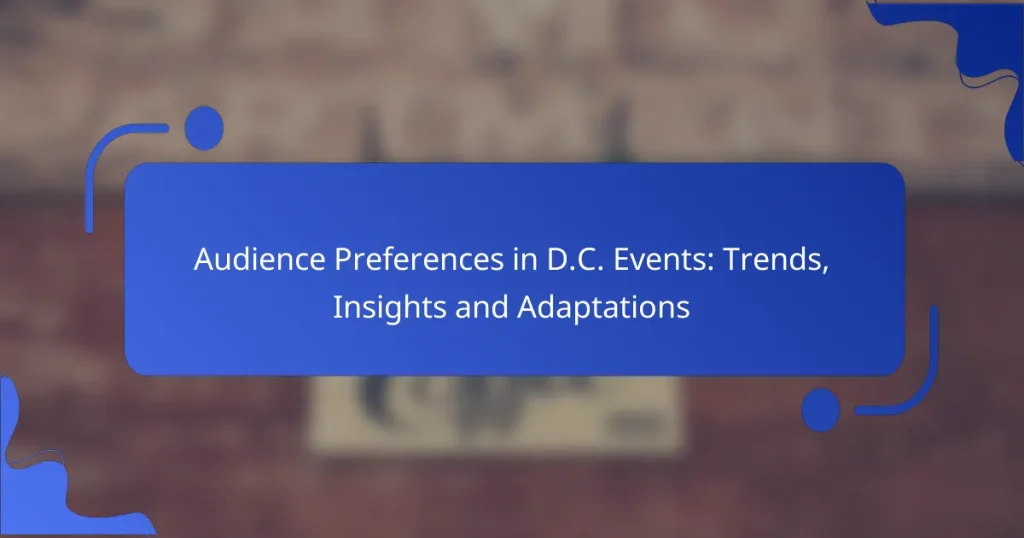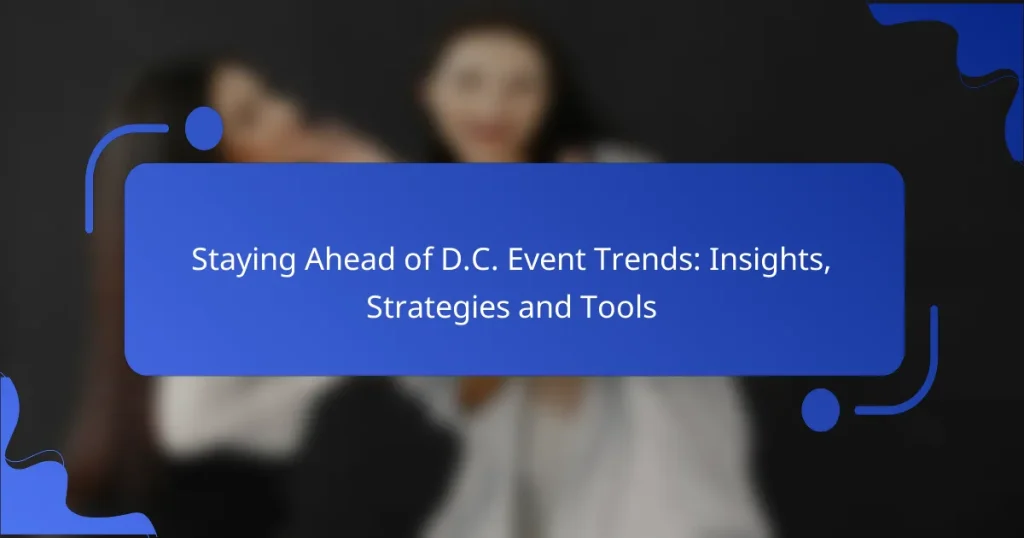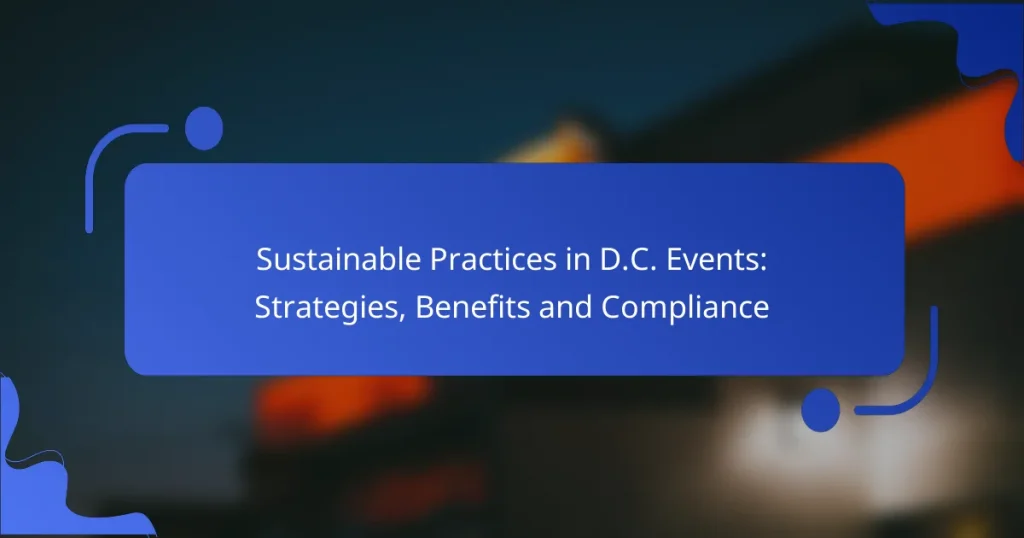Event trends in Washington, D.C. are evolving rapidly, with a notable emphasis on hybrid formats that combine in-person and virtual experiences. Organizers are prioritizing sustainability and advanced technology to enhance engagement and ensure safety. As a result, event planners are adopting innovative strategies to create memorable experiences across a diverse range of venues, from iconic outdoor spaces to cultural institutions.
Emerging Trends in D.C. Events: Innovations, Formats and Engagement
Popular Themes in D.C. Events: Styles, Topics and Audience Appeal
Technology in D.C. Events: Integration, Tools and Experiences
Audience Preferences in D.C. Events: Trends, Insights and Adaptations
Staying Ahead of D.C. Event Trends: Insights, Strategies and Tools
Sustainable Practices in D.C. Events: Strategies, Benefits and Compliance
What are the top event trends in Washington, D.C.?
The top event trends in Washington, D.C. reflect a shift towards hybrid formats, sustainability, and advanced technology. Organizers are increasingly focusing on creating engaging experiences that prioritize networking while adhering to health and safety protocols.
Hybrid events gaining popularity
Hybrid events, which combine in-person and virtual elements, are becoming a staple in Washington, D.C. This format allows for greater flexibility and accessibility, enabling attendees to participate from anywhere. Organizers should consider platforms that facilitate seamless interaction between in-person and online participants.
To successfully implement hybrid events, ensure that technology supports both audiences effectively. This includes high-quality streaming services and interactive tools that allow virtual attendees to engage with on-site activities.
Focus on sustainability
Sustainability is a key concern for event planners in Washington, D.C., with many aiming to reduce their environmental impact. This includes using eco-friendly materials, minimizing waste, and choosing venues that prioritize green practices. Organizers can also encourage attendees to use public transportation or carpool to reduce carbon footprints.
Incorporating local vendors and sustainable catering options can further enhance the event’s eco-friendly profile. Providing digital materials instead of printed ones is another effective strategy to promote sustainability.
Increased use of technology
Technology plays a crucial role in modern events, especially in Washington, D.C. From registration to engagement, leveraging tools like event apps, live polling, and virtual reality can significantly enhance the attendee experience. Organizers should stay updated on the latest tech trends to incorporate innovative solutions.
Utilizing data analytics can also help in understanding attendee preferences and improving future events. Consider investing in technology that allows for real-time feedback to adapt and enhance the experience on the spot.
Networking opportunities emphasized
Networking remains a vital component of events in Washington, D.C., with organizers focusing on creating meaningful connections. This can be achieved through structured networking sessions, breakout discussions, and social activities that encourage interaction among attendees.
Facilitating introductions and using event apps that highlight attendee interests can further enhance networking opportunities. Providing comfortable spaces for informal conversations is also essential to foster connections.
Health and safety protocols
Health and safety protocols continue to be a priority for events in Washington, D.C., especially in light of recent global health concerns. Organizers must stay informed about local regulations and guidelines to ensure compliance and attendee safety. This may include capacity limits, mask mandates, and sanitation measures.
Communicating health protocols clearly to attendees before the event is crucial. Providing hand sanitizing stations and ensuring proper ventilation in venues can help create a safe environment for all participants.
How are event planners adapting to these trends?
Event planners in Washington, D.C. are increasingly incorporating innovative strategies to keep pace with evolving trends. This includes blending in-person and virtual elements, adopting sustainable practices, and leveraging technology for streamlined management.
Implementing virtual components
Event planners are integrating virtual components to enhance accessibility and engagement. This may involve live streaming events or creating hybrid formats that allow remote participation. By doing so, planners can reach a broader audience and provide flexible options for attendees.
When incorporating virtual elements, consider using platforms that support interactive features like Q&A sessions or polls. This can help maintain audience engagement and foster a sense of community, even in a digital format.
Incorporating eco-friendly practices
Eco-friendly practices are becoming essential in event planning, with many organizers prioritizing sustainability. This can include using biodegradable materials, reducing waste, and choosing venues that prioritize green initiatives. Implementing these practices not only benefits the environment but also appeals to environmentally conscious attendees.
To effectively incorporate sustainability, planners should evaluate their supply chain and seek local vendors who share similar values. This can reduce carbon footprints and support the local economy, making the event more impactful.
Utilizing event management software
Event management software is crucial for streamlining planning processes and enhancing efficiency. These tools can assist with registration, scheduling, and communication, allowing planners to focus on delivering a successful event. Many software options also offer analytics features to assess attendee engagement and satisfaction.
When selecting event management software, consider factors such as user-friendliness, integration capabilities, and customer support. A good platform should simplify tasks and provide valuable insights, helping planners make informed decisions for future events.
What are the most popular venues for events in Washington, D.C.?
The most popular venues for events in Washington, D.C. include a mix of large convention centers, iconic outdoor spaces, and renowned cultural institutions. These locations cater to various types of events, from conferences to public gatherings, and offer unique atmospheres and amenities.
Walter E. Washington Convention Center
The Walter E. Washington Convention Center is a premier venue for large-scale events, including trade shows, conventions, and corporate meetings. With over 2 million square feet of space, it can accommodate thousands of attendees and features modern facilities and technology.
When planning an event here, consider the availability of breakout rooms and exhibition halls. Booking well in advance is advisable, especially for peak seasons, as this venue is a popular choice for many organizations.
National Mall
The National Mall is an iconic outdoor venue that hosts a variety of public events, including festivals, concerts, and demonstrations. Its expansive green spaces and historic landmarks provide a picturesque backdrop for gatherings of all sizes.
Permits are required for events on the National Mall, and organizers should plan for logistics such as crowd control and accessibility. Be mindful of the weather, as outdoor events can be affected by seasonal conditions.
Smithsonian Institution venues
The Smithsonian Institution offers several venues across its museums and galleries, making it a unique choice for events that want to incorporate culture and education. Spaces range from intimate meeting rooms to grand halls, each with distinct themes and exhibits.
When selecting a Smithsonian venue, consider the specific museum’s focus and how it aligns with your event’s purpose. Booking early is essential, as these venues are in high demand, especially during tourist seasons.
How do event trends impact local businesses in Washington, D.C.?
Event trends significantly influence local businesses in Washington, D.C. by driving increased foot traffic and creating new opportunities for revenue generation. As events attract visitors, they stimulate demand for various services and products, benefiting a wide range of sectors.
Boost in hospitality sector
The hospitality sector in Washington, D.C. experiences a notable boost during major events, such as conferences, festivals, and political gatherings. Hotels and restaurants often see increased bookings and higher occupancy rates, especially during peak seasons.
For example, hotels may raise their rates by 20-30% during significant events, while restaurants can expect to serve larger crowds, leading to higher sales. Local establishments that adapt their offerings to cater to event attendees can maximize their profits.
Increased demand for local vendors
Local vendors, including caterers, event planners, and entertainment providers, benefit from heightened demand during events in Washington, D.C. These vendors often receive more inquiries and contracts, leading to increased revenue opportunities.
For instance, a local catering company might see a surge in orders for corporate events, while event planners may be hired for multiple functions simultaneously. Vendors that establish strong relationships with event organizers can secure repeat business and referrals, enhancing their market presence.
What are the key factors for successful event planning in Washington, D.C.?
Successful event planning in Washington, D.C. hinges on understanding local regulations, assessing audience preferences, and leveraging the city’s unique cultural landscape. These elements help ensure compliance, enhance attendee satisfaction, and create memorable experiences.
Understanding local regulations
Familiarity with local regulations is crucial for event planners in Washington, D.C. This includes obtaining necessary permits, adhering to noise ordinances, and following safety codes. For instance, outdoor events may require special permits from the D.C. Department of Transportation.
Additionally, planners should be aware of health and safety regulations, especially in light of recent public health concerns. This may involve capacity limits, sanitation requirements, and emergency plans. Consulting with local authorities early in the planning process can help avoid costly delays.
Assessing audience preferences
Understanding audience preferences is essential for tailoring events that resonate with attendees. Conducting surveys or focus groups can provide insights into what potential participants value, such as venue type, catering options, and entertainment styles. For example, younger audiences may prefer interactive experiences, while corporate attendees might prioritize networking opportunities.
Moreover, considering the cultural diversity of Washington, D.C. can enhance engagement. Incorporating local traditions or themes can make events more relatable and enjoyable. Planners should continuously gather feedback to refine their approach and meet evolving preferences.
